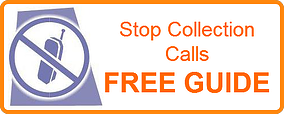 A wage garnishment can be devastating!
A wage garnishment can be devastating!
Here are 3 tips on how to stop a wage garnishment:
1. DON'T IGNORE A SUMMONS!
There are several steps that a creditor must take before they can apply for a writ of garnishment.
First, a creditor must hire an attorney that is licensed within your state to file COMPLAINT with your local, county court.
A COMPLAINT is an official/legal statement that you owe a certain amount to someone.
For example, let's say you have a Visa card and due to a severe financial circumstance...
- Loss of employment
- Illness
- Divorce
- Death of a spouse
- Disability
... you find yourself unable to make any payments.
After a few months of calls and letters (HOW TO STOP COLLECTION CALLS), a creditor may choose to file a complaint.
Once the complaint is filed, a SUMMONS is prepared and delivered to you.
The SUMMONS will state that the creditor (called the Plaintiff) will state exactly what you (the Defendant) owe.
It will also state that you have a certain number of days to give an ANSWER.
An answer, is a legal document that you file with the court (yes, there is a significant fee to file an answer) whereby you state why you do not owe the debt.
But, in 99.9% of the time, most people know they owe the debt.
Unfortunately, this summons and legal procedure could have been avoided if you had contacted the collector or a Debt Management Company .
2. YOU SHOULD TRY TO NEGOTIATE A SETTLMENT OR STIPULATED AGREEMENT BEFORE THEY MOVE FOR A DEFAULT JUDGMENT.
Once a complaint has been filed and a summons delivered, the creditor or collector has had to pay extra money to the court/attorney/summons delivery company, etc.
They may not be in a postilion to offer much of a settlement, but you should always try.
If a settlement cannot be reached, most of the time a STIPULATED AGREEMENT can be arranged.
A stipulated agreement is an agreement that you make to pay back (usually 100%) of the debt plus fees and interest over a certain length of time.
The reason you would do this is to avoid the court awarding the collector (Plaintiff) a DEFAULT JUDGMENT, which will be awarded to the plaintiff by default, since you are not going to contest that you owe the debt.
It is only AFTER the judgment is awarded that the creditor can apply for a writ of garnishment.
My point is that you shouldn't PANIC just because you receive a SUMMONS and/or a JUDGMENT.
We have been able to help hundreds of clients avoid wage garnishment, but the key is to TAKE ACTION!
I know we are talking about WAGE GARNISHMENT, but once a judgment is awarded, a collector can come after your BANK ACCOUNT....UNLESS...
3. MANY SOURCES OF INCOME ARE EXEMPT FROM WAGE GARNISHMENT:
Here are a few of the types of "income" that are exempt from garnishment in Oregon:
- Social Security
- Supplemental Security Income (SSI)
- Disability benefits
- Welfare or any public assistance
- Spousal or child support
- Pensions (public or private)
- Veterans benefits
- Disability proceeds from a life insurance or disability policy
- Cash surrender value of life insurance
- Many others (click to see complete list)
As of May 1, 2011, anyone applying for Social Security Benefits were required to have their checks direct-deposited to their bank.
As of March 1, 2013, anyone who had been receiving their Social Security Benefit checks by mail had to switch to a Direct Deposit with their bank.
But, there was another very important law passed on May 1, 2011.
If a bank receives a garnishment order (only after a judgment was awarded the creditor), the bank cannot freeze or release money that came from social security benefits if the government deposited the benefits directly into your account within two months prior to garnishment order.
After receiving the garnishment order, the bank must know perform a two month "look back" check to determine the source of funds in your account.
The bank must report to you within a few days of their "investigation" and let you know what they plan to do.
WORD OF CAUTION....
- Social Security (or other retirement benefits) are not protected from payment of:
- Child support
- Alimony
- Federal and/or State Taxes
- Federally insured Student Loans
One final warning about protecting your Social Security and/or other Retirement Income from garnishment..
- 1. Do not co-mingle your Social Security Benefits with other funds. This could remove the exemption!
- 2. If you transfer money from the account that received the Social Security Benefit to another account (a savings account for example), that account will not be protected!
If you have questions or could use some advice, please let us know! We've been helping people with severe debt issues for a long time, and we can help you to.




 If you live in Texas, you have some unique laws that make debt settlement a great way to eliminate old credit card or other unsecured debts.
If you live in Texas, you have some unique laws that make debt settlement a great way to eliminate old credit card or other unsecured debts.
 If you have received wage garnishment due to a judgment issued on your unpaid credit cards or other personal loans, it may be possible to stop it.
If you have received wage garnishment due to a judgment issued on your unpaid credit cards or other personal loans, it may be possible to stop it. If you answer the door and are handed a summons, there are some things you must do:
If you answer the door and are handed a summons, there are some things you must do: We get asked this question nearly every day. So, it's time to answer the question:
We get asked this question nearly every day. So, it's time to answer the question:

 In most states, a wage garnishment for non-payment of debt is approximately 25% of your net, after-tax income.
In most states, a wage garnishment for non-payment of debt is approximately 25% of your net, after-tax income.

 HELP! They took money out of my paycheck and I can't pay my rent!
HELP! They took money out of my paycheck and I can't pay my rent!

